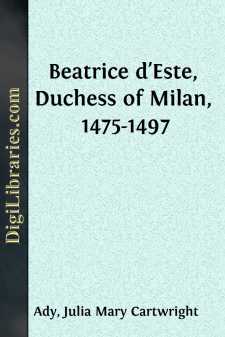Categories
- Antiques & Collectibles 13
- Architecture 36
- Art 48
- Bibles 22
- Biography & Autobiography 813
- Body, Mind & Spirit 142
- Business & Economics 28
- Children's Books 17
- Children's Fiction 14
- Computers 4
- Cooking 94
- Crafts & Hobbies 4
- Drama 346
- Education 46
- Family & Relationships 57
- Fiction 11829
- Games 19
- Gardening 17
- Health & Fitness 34
- History 1377
- House & Home 1
- Humor 147
- Juvenile Fiction 1873
- Juvenile Nonfiction 202
- Language Arts & Disciplines 88
- Law 16
- Literary Collections 686
- Literary Criticism 179
- Mathematics 13
- Medical 41
- Music 40
- Nature 179
- Non-Classifiable 1768
- Performing Arts 7
- Periodicals 1453
- Philosophy 64
- Photography 2
- Poetry 896
- Political Science 203
- Psychology 42
- Reference 154
- Religion 513
- Science 126
- Self-Help 84
- Social Science 81
- Sports & Recreation 34
- Study Aids 3
- Technology & Engineering 59
- Transportation 23
- Travel 463
- True Crime 29
Beatrice d'Este, Duchess of Milan, 1475-1497
Description:
Excerpt
During the last twenty years the patient researches of successive students in the archives of North Italian cities have been richly rewarded. The State papers of Milan and Venice, of Ferrara and Modena, have yielded up their treasures; the correspondence of Isabella d'Este, in the Gonzaga archives at Mantua, has proved a source of inexhaustible wealth and knowledge. A flood of light has been thrown on the history of Italy in the fifteenth and sixteenth centuries; public events and personages have been placed in a new aspect; the judgments of posterity have been modified and, in some instances, reversed.
We see now, more clearly than ever before, what manner of men and women these Estes and Gonzagas, these Sforzas and Viscontis, were. We gain fresh insight into their characters and aims, their secret motives and private wishes. We see them in their daily occupations and amusements, at their work and at their play. We follow them from the battle-field and council chamber, from the chase and tournament, to the privacy of domestic life and the intimate scenes of the family circle. And we realize how, in spite of the tragic stories or bloodshed and strife that darkened their lives, in spite, too, of the low standard of morals and of the crimes and vices that we are accustomed to associate with Renaissance princes, there was a rare measure of beauty and goodness, of culture and refinement, of love of justice and zeal for truth, among them. As the latest historian of the Papacy, Dr. Pastor, has wisely remarked, we must take care not to paint the state of morals during the Italian Renaissance blacker than it really was. Virtue goes quietly on her way, while vice is noisy and uproarious; the criminal forces himself upon the public attention, while the honest man does his duty in silence, and no one hears of him. This is especially the case with the women of the Renaissance. They had their faults and their weaknesses, but the great majority among them led pure and irreproachable lives, and trained their children in the paths of truth and duty. Even Lucrezia Borgia, although she may not have been altogether immaculate, was not the foul creature that we once believed. And the more closely we study these newly discovered documents, the more we become convinced that this age produced some of the most admirable types of womanhood that the world has ever seen. When Castiglione painted his ideal woman in the pages of the "Cortigiano," he had no need to draw on his imagination. Elizabeth Gonzaga, Duchess of Urbino, and Isabella d'Este, Marchioness of Mantua, were both of them women of great intellect and stainless virtue, whose genuine love of art and letters attracted the choicest spirits to their court, and exerted the most beneficial influence on the thought of the day. Isabella, whose vast correspondence with the foremost painters and scholars of the age has been preserved almost intact, was probably the most remarkable lady of the Renaissance. The story of her long and eventful life—a theme of absorbing interest—yet remains to be written. The present work is devoted to the history of her younger sister, Beatrice, Duchess of Milan, who, as the wife of Lodovico Sforza, reigned during six years over the most splendid court of Italy. The charm of her personality, the important part which she played in political life at a critical moment of Italian history, her love of music and poetry, and the fine taste which she inherited, in common with every princess of the house of Este, all help to make Beatrice singularly attractive, while the interest which she inspires is deepened by the pathos of her sudden and early death.
If in Isabella we have the supreme representative of Renaissance culture in its highest and most intellectual phase, Beatrice is the type of that new-found joy in life, that intoxicating rapture in the actual sense of existence, that was the heritage of her generation, and found expression in the words of a contemporary novelist, Matteo Bandello—himself of Lombard birth—when with his last breath he bade his companions live joyously, "Vivete lieti!" We see this bride of sixteen summers flinging herself with passionate delight into every amusement, singing gay songs with her courtiers, dancing and hunting through the livelong day, outstripping all her companions in the chase, and laughing in the face of danger....


